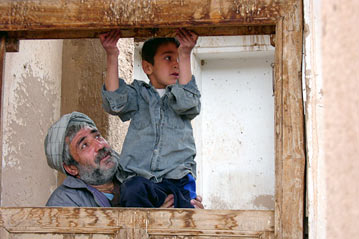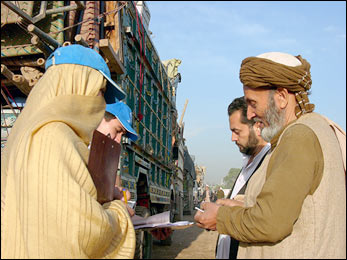From one end of Afghanistan to another, refugee families share desire for home
From one end of Afghanistan to another, refugee families share desire for home

PESHAWAR, Pakistan, April 24 (UNHCR) - Soon after the Soviet invasion of Afghanistan in 1979, Mohammed Afzal, his wife and their teenage son fled their home near Jalalabad and sought safety across the border in Pakistan.
Their journey ended at a small camp populated by other refugees in the city of Peshawar. The area came to be known as Katchagari, meaning mud settlement. Today, it is a busy community of some 50,000 Afghans. Since arriving more than 20 years ago, like Katchagari, the family of Mohammed Afzal has also grown, from three to 14 people.
With Katchagari facing closure at the end of April and its residents being offered the choice of relocation to other camps or repatriation assistance through UNHCR, Mohammed Afzal has decided to end his decades as a refugee and return home.
"We have many hopes for our return," he says as the family loads the contents of their house into a gaudily painted truck. "But our country also has expectations of us. It cannot rebuild itself from the turmoil of more than three decades of war. We should be the ones who go back and help with its reconstruction."
More than 1,500 km away, on Afghanistan's border with Iran, Abdul Sattar has nearly completed his return. He and his family have travelled overnight from Tehran on buses provided by the UN refugee agency, and their home is now only another two hours' drive away.
"Our decision to return was based on the security situation in this area," says Abdul Sattar. "Life as a refugee is not easy, even in a large city such as Tehran. Now that the fighting has ended, we wanted to return to our own country."
Mohammed Afzal and Abdul Sattar are two of the most recent participants in what, for the past four years, has been the largest organized repatriation programme on earth. The fall of the Taliban in 2001 ended decades of civil war in Afghanistan. With the prospect of peace, more than 4.5 million refugees have returned home, the majority assisted by UNHCR.
With the return of more than half a million refugees last year, Afghanistan continued to represent the agency's largest return operation.
The morning of their departure, the family of Mohammed Afzal arrive early at the UNHCR registration centre in Peshawar.
As well as registering with the refugee agency, each returning individual over the age of six undergoes an iris scan. This minimizes the risk of returnees receiving repatriation assistance more than once, and ensures that funding from UNHCR's donors achieves maximum benefit.
The family's vehicles then navigate the steep turns of the Khyber Pass. At the border town of Torkham, a bustling frontier outpost surrounded by rugged mountains, they meet briefly with UNHCR monitors before crossing into Afghanistan.
With nine children and two wives to consider, Mohammed Afzal's son, Essan, is aware that his decision to return home brings with it considerable responsibilities.
"We have come here with hopes for a better life," he says. "Afghanistan is making progress and I hope to be able to put my children in school."
All of Essan's children were born in Pakistan and know no other home than Katchagari. But his youngest daughter, Annisa, shows no apprehensions as she travels through this new land.
"Why should Afghanistan be unfamiliar to me?" she says as she squeezes an inflatable toy. "A lot of my relatives are here."
Two hours after crossing the border they arrive at their village. For Mohammed Afzal, a four-hour road journey has brought to an end a 25-year story of upheaval and exile.
In the Injil district of Herat, in western Afghanistan, Abdul Sattar's return brings out neighbours eager to welcome him back from Iran. Like Abdul Sattar, many are veterans of Afghanistan's years of war who have lost limbs in the fighting. With the help of a walking stick, Abdul Sattar inspects his former home, which has been badly damaged during his absence.
"I want to rebuild my house," he says. "But until I can raise the money, I will have to share with my brother."
In addition to helping refugees return home, UNHCR seeks to assist vulnerable individuals to resettle into their former communities. Through its shelter programme it has helped more than 140,000 families to rebuild.
Abdul Sattar completes his journey by visiting the UNHCR reception centre in Herat. All refugees returning through UNHCR receive a transportation grant of between US$4 and US$37 depending on the distance to their destination, as well as US$12 per person to help with immediate needs.

The recent adoption of the Afghanistan Compact signalled the start of a new phase in Afghanistan's development. Now in its fifth year, a repatriation programme that has directly assisted more than 3.5 million Afghans to return home is also entering a new phase - as UNHCR with the governments of Afghanistan, Pakistan and Iran look to the future.
On Afghanistan's borders, meanwhile, the momentum created by the unprecedented return continues, with a further 600,000 Afghans expected to return from Pakistan and Iran in 2006.
By Tim Irwin in Afghanistan
and Babar Baloch in Pakistan








